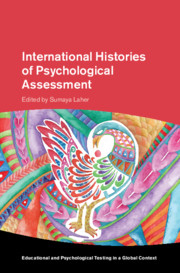Book contents
- International Histories of Psychological Assessment
- Educational and Psychological Testing in a Global Context
- International Histories of Psychological Assessment
- Copyright page
- Contents
- Tables
- Contributors
- Series Editor’s Foreword
- Chapter 1 Histories of Psychological Assessment
- Chapter 2 Psychological Assessment in Southern Africa
- Chapter 3 Psychological Testing and Inclusive Schooling
- Chapter 4 Psychological Assessment in West Africa
- Chapter 5 Psychological Assessment in the Levant
- Chapter 6 The History of Assessment in the Nordic Countries
- Chapter 7 Key Episodes in The History of Testing in Central Western Europe
- Chapter 8 The Beginnings of Psychological Assessment in Spain and Portugal
- Chapter 9 Histories of Psychological Assessments in the United Kingdom
- Chapter 10 The Early History of Psychological Testing in Eastern Europe and Russia
- Chapter 11 Hearing the Untold
- Chapter 12 History of Psychological Assessment in Southern Asia
- Chapter 13 The History of Psychological Testing in East Asia
- Chapter 14 Psychological Assessment and Testing in Malaysia and Singapore
- Chapter 15 A Brief History of Testing and Assessment in Oceania
- Chapter 16 Psychological Assessment in South America
- Chapter 17 Historical Development of Psychological Assessment in the Caribbean
- Chapter 18 The History of Psychological Assessment in North America
- Chapter 19 Looking Back, Moving Forward
- Index
- References
Chapter 8 - The Beginnings of Psychological Assessment in Spain and Portugal
Published online by Cambridge University Press: 28 July 2022
- International Histories of Psychological Assessment
- Educational and Psychological Testing in a Global Context
- International Histories of Psychological Assessment
- Copyright page
- Contents
- Tables
- Contributors
- Series Editor’s Foreword
- Chapter 1 Histories of Psychological Assessment
- Chapter 2 Psychological Assessment in Southern Africa
- Chapter 3 Psychological Testing and Inclusive Schooling
- Chapter 4 Psychological Assessment in West Africa
- Chapter 5 Psychological Assessment in the Levant
- Chapter 6 The History of Assessment in the Nordic Countries
- Chapter 7 Key Episodes in The History of Testing in Central Western Europe
- Chapter 8 The Beginnings of Psychological Assessment in Spain and Portugal
- Chapter 9 Histories of Psychological Assessments in the United Kingdom
- Chapter 10 The Early History of Psychological Testing in Eastern Europe and Russia
- Chapter 11 Hearing the Untold
- Chapter 12 History of Psychological Assessment in Southern Asia
- Chapter 13 The History of Psychological Testing in East Asia
- Chapter 14 Psychological Assessment and Testing in Malaysia and Singapore
- Chapter 15 A Brief History of Testing and Assessment in Oceania
- Chapter 16 Psychological Assessment in South America
- Chapter 17 Historical Development of Psychological Assessment in the Caribbean
- Chapter 18 The History of Psychological Assessment in North America
- Chapter 19 Looking Back, Moving Forward
- Index
- References
Summary
Spain and Portugal share the territory of the Iberian Peninsula at the southwestern end of the European continent. They are two countries with remarkable similarities but also with marked peculiarities of their own. They form two of the oldest states in Europe and both experienced a period of splendor and glory during the fifteenth to sixteenth centuries, as a result of the great maritime expeditions undertaken, and the vast territories first explored by European countries. Both Spain and Portugal suffered an extended period of decline from the eighteenth century onwards, from which they have only been able to recover in the second half of the twentieth century. This historical evolution has strongly conditioned, as it could not be otherwise, the development of economic and scientific activities in both countries, which logically also applies to the use of psychological assessment instruments. This chapter briefly describes the evolution of psychological assessment techniques in Spain and Portugal, following a chronological order, paying greater attention to the early days, which are generally less well known, and identifying the most outstanding milestones or those that have had the greatest impact in the scientific field and in professional practice.
- Type
- Chapter
- Information
- International Histories of Psychological Assessment , pp. 134 - 150Publisher: Cambridge University PressPrint publication year: 2022
References
- 1
- Cited by



